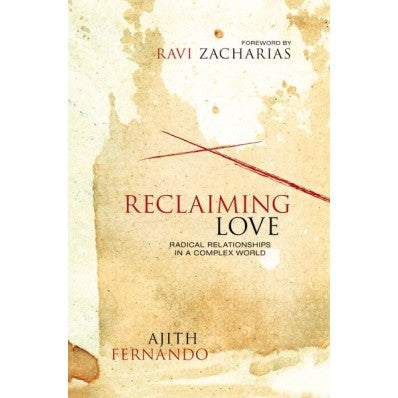by Ajith Fernando, adapted from his book Reclaiming Love: Radical Relationships in a Complex World.
Antoine Rutayisire, a church leader from Rwanda who lost many of his loved ones in the Rwandan genocide, is now actively involved in bringing healing to his land. During a visit he made to Sri Lanka I talked with him about the difficult task of leading people who have been deeply wounded to forgive those who have hurt them. Antoine shared that caution is needed in many of these cases. He said that it can be damaging to try forcing people to forgive those who have hurt them before they are ready for it. To glibly tell deeply hurt people to forgive communicates to them that we aren’t taking the wrong that was done to them seriously. We must remember that God is a God of justice, and there are consequences to sin.
This means that we must never downplay the seriousness of wrongdoing or sinful behavior. We must remember that it was precisely because sin was so serious that God’s own Son had to die a painful death on a Roman cross to win our forgiveness.
We must exercise caution when we approach hurting people. As we seek to help them, we should cultivate an attitude that is sensitive to the wrongness of the hurts they have experienced.
If we begin with an honest acknowledgment of their hurt and then help them bring that pain to God in the form of a lament, this openness about their pain and the wrong that was done to them can unlock the door to God’s comfort and healing. And though the process of healing may be long and complex, somewhere in this process there must be a place for forgiving and loving those who hurt us.
Here, then, are two great truths we must meditate on and grasp deep in our hearts, truths that can help us to forgive people who hurt us. We begin by believing these two truths, even if we don’t feel them.
The Christian life is a life of faith, trusting that what God says is true and that it has power to save us and heal us. As we begin to believe that (1) God’s love for us is greater than the wickedness we face and that (2) he will turn this situation into good (see
Sadly, not all Christians want to believe these truths. Many Christians want to cling tightly to an identity as a victim, believing that they have been wronged in a way that cannot be healed or forgiven. This gives them an excuse to nurture their anger and negative feelings about others. Self-pity is a reliable friend who gladly satisfies our innate desire to feel sorry for ourselves. Though our friends may tire of listening to our tale of woe, self-pity always provides us with a ready audience.
One of the most difficult challenges I have had in my years of ministry is persuading people to apply God’s love and sovereignty to their wounds. Believing the two powerful truths we have looked at above inevitably forces us to part ways with our self-pity.
— Ajith Fernando, Reclaiming Love: Radical Relationships in a Complex World. Read more for a deeper exploration of how truth saves us from self-pity, and how we can learn to love wrongdoers without compromising justice.
How to Use This Book
What should love really look like in our relationships—especially our tough relationships? Your leadership team or small group will find biblical ways forward in Ajith Fernando’s Reclaiming Love.
“Reclaiming Love reflects a lifetime of wisdom from a seasoned counselor, leader, and Bible scholar,” writes author Ravi Zacharias. “It is a masterful study of a familiar yet difficult-to-apply chapter on love. We long for a corrective within. We long for beautiful relationships. As Ajith illustrates, those two realities are made possible only through Jesus Christ, who enables us to persevere, to forgive, to surrender, and to hope. That is love and that is the gospel. I have learned much from Ajith over the years, and I know that you will be enriched as you study this book and consider the great truths of 1 Corinthians 13. I wholeheartedly recommend Reclaiming Love.”
Reclaiming Love is now in softcover for the first time.

